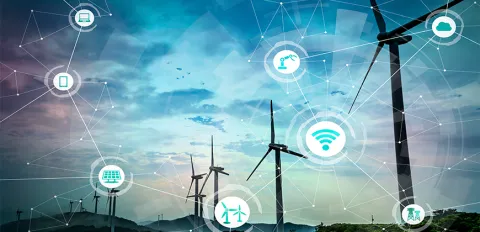Guest Speaker Series: Sanjeet Sanghera on Getting to Net Zero

- Master of Engineering Leadership
Students in the Master of Engineering Leadership (MEL) met virtually with a leading expert on the major trends shaping the pathway to net zero, including the economics of renewable energy, decentralization of the power system and the need for digitalization.
Sanjeet Sanghera, Head of Grids and Utilities at BloombergNEF, spoke with students and answered questions about transitioning renewable energy systems and the factors that need to be considered when assessing or developing net zero energy solutions.
Clean Energy Transition
After graduating from UBC with a degree in electrical engineering and working for nine years at BC Hydro, Sanjeet went to Cambridge to complete an MBA. Since November 2019, he’s worked for BloombergNEF, a strategic research provider based in London that covers global commodity markets and the disruptive technologies driving the transition to a low-carbon economy. BloombergNEF leverages sophisticated data sets to create clear perspectives and in-depth forecasts that frame the financial, economic and policy implications of industry-transforming trends and technologies.
“I am passionate about the clean energy transition as a means to achieve net-zero carbon emissions,” he says. “The EU shares a similar vision towards clean energy transition and power decentralization as a means to reduce its carbon footprint, but requires people to help with policy planning and technologies implementation.”
He believes that over the next 30 years, the world will see a large shift towards renewable energy, such as wind and solar power generation. This shift reflects governments’ recognition of the need for a decentralized power network where regions can choose appropriate power sources for specific industry and consumer needs. Sandeep highlighted the importance of the infrastructure grid to distribute energy generated by decentralized power generation systems and noted that without federal policies in place to support this development, it will be difficult for regions to undertake projects that balance economics and environmental and stakeholder concerns.
The UK, for example, was able to develop new infrastructure thanks to the government’s mandate to increase wind energy power production to 20% by 2030.
RENEWABLE ENERGY INDUSTRY TRENDS
Sandeep talked about the business side of the energy transition, and how government policies, level energy costs and infrastructure development can directly impact the uptake of renewable energy.
A VALUABLE NETWORKING AND LEARNING OPPORTUNITY
It was clearly an inspiring session, with students energized by the opportunity to connect with an industry leader in clean energy and learn about global energy transition trends. Sandeep also provided MEL students with professional development advice on how to engage with BloombergNEF through its experiential learning programs, and he mentioned employment opportunities with the organization.
This is one of many guest speaker events hosted by the MEL and MHLP throughout the year. These exclusive events enable students to network with industry leaders and expand their understanding of the latest trends.
Along with the interdisciplinary technical and business focus of the curriculum, these professional development opportunities equip students with the knowledge, networks and skills required to become leaders in their fields.


